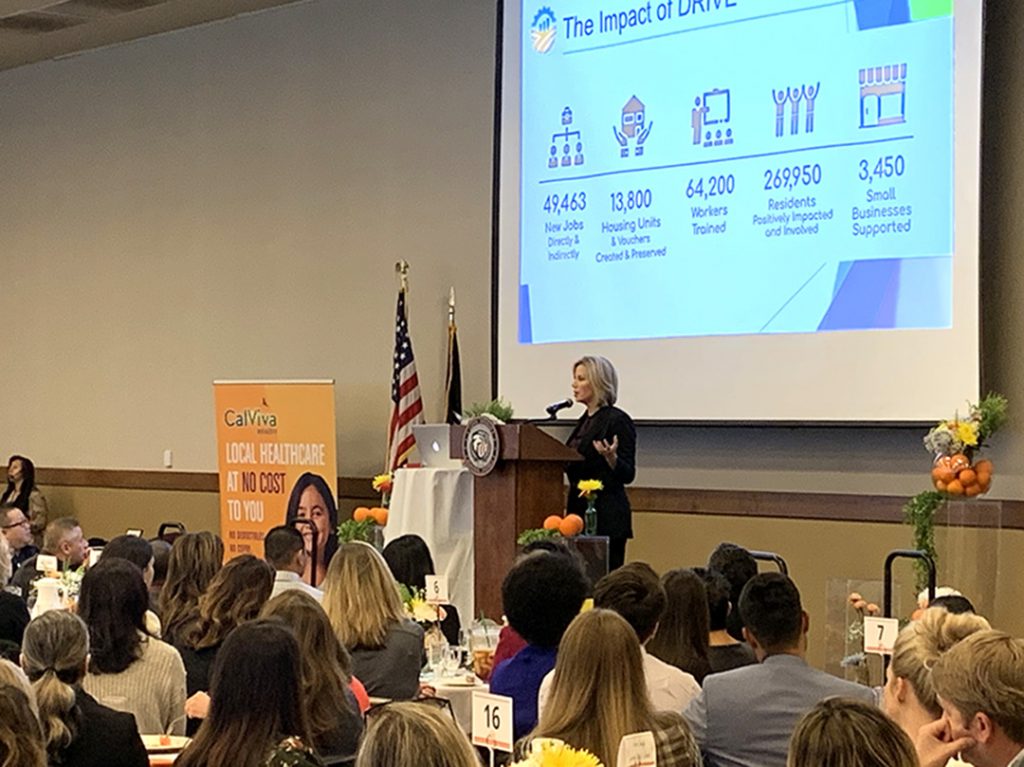
Hundreds gathered at the Clovis Veterans Memorial District Feb. 7 for the Fresno Community Health Partnership’s third annual State of Our Health Breakfast.
Several Fresno County organizations and nonprofit groups, several of which focused on health, attended the event.
A number of FCHIP founders were honored at the beginning of the breakfast, including Clovis City Councilmember Lynne Ashbeck, who served as FCHIP’s chair for three years.
“FCHIP was about trying to get all the resources in our community rolling together. We don’t need more programs on Asthma we need aligned programs on asthma. I was honored to serve as the chair for three years,” Ashbeck said.
A number of high-profile speakers addressed the audience, including Fresno County Department of Public Health Assistant Director David Luchini, Central Valley Community Foundation President and CEO Ashley Swearengin, and, most notably, California Surgeon General Dr. Nadine Burke Harris.
Luchini shared information about the Public Health Department’s community needs assessment. He said the goals of the assessment are to identify the root causes of Fresno County’s health needs, build on previous assessments and engage with community stakeholders to develop a plan of action that promotes equitable health solutions.
“The Community Health Needs assessment was conducted with three large goals in mind. The project aims to gather community residents and organizational leaders alike to align, collaborate and leverage rescores to identify and address the root causes of our community’s health needs,” Luchini said.
There were 480 participants who took part of the assessment, including geo focus groups, oral health focus groups, stakeholder groups and representatives of vulnerable populations.
The Public Health Department will release a simplified version of the assessment once it is completed. The assessment will help the department create community health improvement plans.
“This will also be a marketing tool to drive partners and the community to work on the next steps,” Luchini said. “We want to engage with partners to determine which priorities are most feasible to work on based on the resources we have and available funding. We want to get commitments from partners who we can best align to make the greatest impact to the health communities. From there we will create a good, solid community health improvement plan.”
Swearengin outlined her DRIVE plan, which she said is a 10-year community investment plan designed to “fundamentally transform the greater Fresno Region by 2030 and create opportunities for all residents to achieve real economic mobility that is inclusive, vibrant and sustainable.”
She said the DRIVE plan would create 49,463 new jobs, 13,800 housing units and vouchers, train 64,200 workers, and positively impact nearly 269,950 residents.
Harris, California’s first Surgeon General keynoted the breakfast. She gave a presentation on adverse childhood experiences (ACE) and outlined a state plan that aims to cut the number of people who suffer from ACE in half.
She said 62.7 percent of California are affected by more than 1 ACE, and 17.6 percent suffer from more than 4 ACEs.
People with high numbers of ACEs are at higher risk of committing suicide or suffering from heart disease and Alzheimer’s. People with high numbers of ACEs are also more likely to be impoverished.
Harris said ACEs drastically affect the economy, as the annual cost of ACEs in California amounts to $112.5 billion.
“We recognize that addressing ACE and its impact on our health, we have a moral and ethical imperative, but we also have an economic imperative, to address ADE as a root cause of many our health and social conditions,” Harris said. “ACEs are not destiny. With the research and the science tells us is that with early detection and evidence based intervention, we can transform health impacts.”
Harris said the state plans on investing in routine primary screenings and research to address and reduce the health impacts of ACEs.
“I have set a bold goal that we are going to cut ace’s and toxic stress in half by one generation,” she said.








